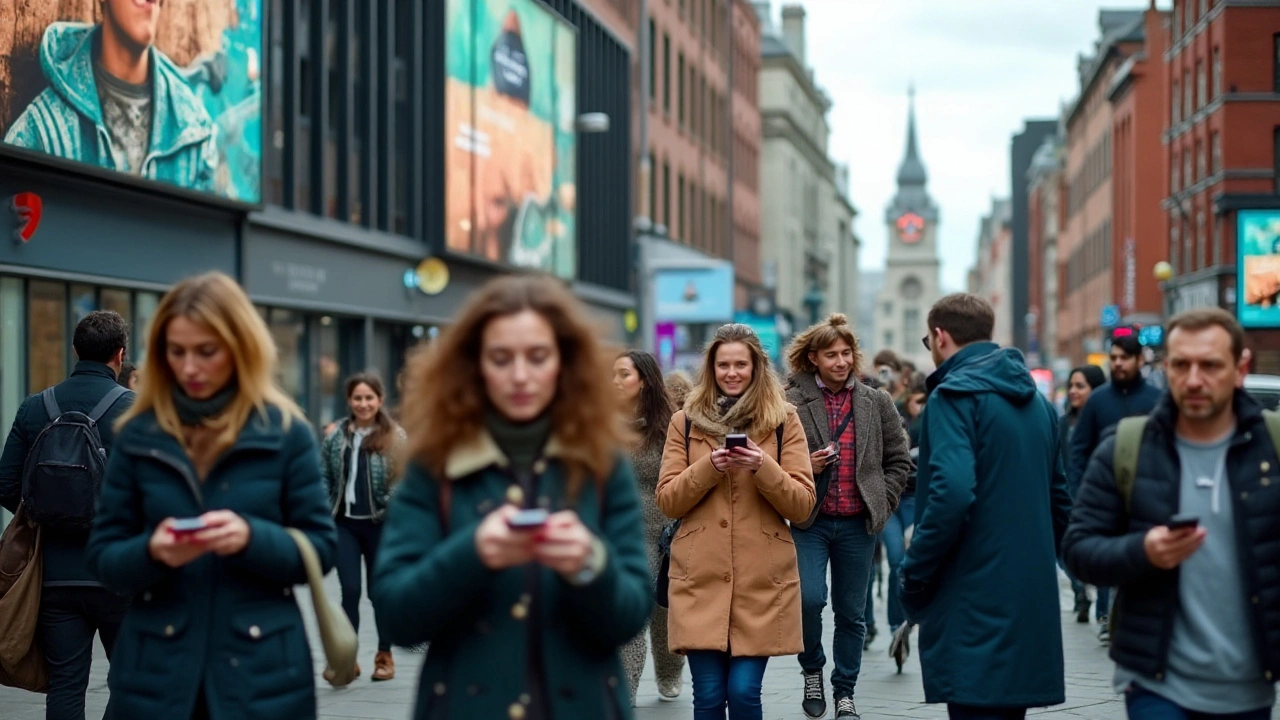Social media is a space in constant flux, with algorithms changing, trends evolving, and user preferences shifting at a rapid pace. Amidst this dynamic environment, brands are always in search of innovative ways to capture attention and foster meaningful interactions with their audience. Enter ChatGPT – a tool that is redefining what it means to engage effectively and creatively on social media platforms.
ChatGPT is a powerful AI that can simulate human-like conversations, allowing brands to connect with users in a more personal and engaging manner. Whether it’s through crafting witty posts, responding to customer inquiries, or even predicting trends, this technology can be a game-changer in digital marketing strategies. But how exactly can brands leverage this tool to boost their social media presence and interact more seamlessly with their audience? That's exactly what we're going to explore.
- The Rise of ChatGPT in Social Media Marketing
- Transforming Audience Interaction and Engagement
- Creative Strategies for Using ChatGPT
- Implementing ChatGPT for Brand Success
The Rise of ChatGPT in Social Media Marketing
The advent of ChatGPT has created a seismic shift in the landscape of social media marketing. As brands vie for attention in an increasingly saturated digital space, AI tools like ChatGPT offer a novel approach to enhancing engagement and driving meaningful conversations. At its core, ChatGPT is an artificial intelligence technology capable of understanding and generating human-like text, making it ideal for dynamic social interactions. Initially, AI was deployed for basic customer service functions—think answering frequently asked questions or assisting in order tracking. However, with advancements in machine learning, ChatGPT can now engage in sophisticated, nuanced dialogues that can mimic human communication remarkably well.
One of the remarkable aspects of ChatGPT is its ability to quickly analyze vast swathes of data and produce tailored responses that resonate with a brand's unique voice and tone. As of 2023, a reported 70% of leading companies have integrated AI-driven solutions into their social media strategies, a trend largely driven by over 80% of consumers expressing a preference for interacting with brands that offer personalized experiences in digital mediums. This rise in preference underscores the critical role AI can now play in creating compelling content that not only engages but also builds brand loyalty.
The year 2022 marked a significant turning point when OpenAI, the firm behind the development of ChatGPT, reported that their technology had surpassed the performance of human operators in specific customer interaction benchmarks. This achievement was cited in a Forbes article where the potential of ChatGPT was likened to "having a world-class copywriter at your disposal 24/7."
"AI-driven tools like ChatGPT aren't just future technology; they're reshaping how we think about digital interaction right now," noted a marketing thought leader in 2023. "They're transforming brands' abilities to connect with their audience on a far more intimate and immediate level."
Beyond replicating human conversation, the flexibility of ChatGPT allows it to create a variety of content forms, ranging from engaging tweets to informative blog posts, all generated within a fraction of the usual time. Marketers have also begun using ChatGPT to predict and respond to trending topics, allowing brands to stay at the forefront of what's relevant to their audience. Reports have shown that posts curated with AI assistance often see a 30% increase in user engagement, underscoring the efficacy of strategic AI implementation.
So, why has ChatGPT become such a integral component of modern brand strategy? It all boils down to scalability, creativity, and adaptability. Unlike traditional marketing teams that might be limited by human constraints, this AI can operate at all hours, breaking barriers of time zones and availability, thus maximizing outreach potential. With these algorithms continuously learning and adapting, they also offer opportunities for brands to continuously refine their voice based on audience interactions. Leveraging ChatGPT means brands are not just keeping pace with digital evolution; they are setting the standards for what's possible in the realm of virtual engagement.
Today’s brands are recognizing the unparalleled value of incorporating AI in their marketing arsenals. With an ever-increasing number of consumers interacting with brands through digital channels—over 90% by some estimates—AI technologies like ChatGPT are not just helpful; they're vital. They empower brands to create personalized, intimate experiences that communicate value, enhance user satisfaction, and cultivate a lasting brand relationship. In a world where the digital marketplace is vastly competitive, staying ahead means enriching your brand's narrative and connection through innovative solutions like ChatGPT.

Transforming Audience Interaction and Engagement
The potential of ChatGPT in revolutionizing how brands engage with audiences on social media cannot be overstated. At the core of its impact is the ability to create a more personalized interaction with users, one that replicates the innate nuances of human conversation. A significant factor in any engagement endeavor is the quality of the interaction, and ChatGPT excels by providing tailored responses based on user inputs. This personalized engagement doesn’t just answer questions—it fosters a sense of connection that encourages users to spend more time with the brand on social media platforms.
The beauty of ChatGPT is in its capability to function around the clock, providing consistent engagement regardless of time zones. Imagine a world where customer inquiries don’t go unanswered for hours or days, a world where users feel acknowledged and valued every minute of the day. That is precisely what this technology offers to brands striving to maintain a robust digital presence. According to a 2023 digital marketing survey, over 60% of users prefer interacting with brands that are accessible 24/7, a demand that ChatGPT meets without breaking a sweat.
A critical aspect of ChatGPT’s deployment lies in its adaptability and ability to understand context. Social media interactions are multi-faceted, with conversations often veering into unexpected territories. The AI’s learning algorithms are designed to navigate these complex scenarios, delivering responses that are not only relevant but imbued with personality. This helps in maintaining the brand's voice and identity across diverse digital interactions. By employing such humanized engagement, brands are seen not merely as entities but as relatable personas people enjoy interacting with.
With the rise of AI-driven tools, ethical considerations around their use have become paramount. Social media platforms aren't just avenues for brand interactions; they are personal spaces where users share aspects of their lives. It is crucial for brands to utilize ChatGPT without violating the trust of their audience. Ensuring transparency about the use of AI tools fosters trust and encourages a more open interaction with users, who are often intrigued by the technological prowess of such tools. During a recent panel discussion on digital ethics, industry leader Mary Adams reflected,
"When users know they are interacting with AI but still feel understood and valued, that’s when technology reaches its true potential."
An effective strategy for leveraging ChatGPT in brand engagement involves its integration into content creation. By analyzing current trends and engaging users through creative and timely posts, brands can stay ahead in the fast-paced digital world. The AI's ability to suggest compelling content ideas or even draft messages ensures that brands maintain an active and appealing presence online. This isn’t just a convenience; it’s a strategic advantage, keeping brands in the public eye without exhausting their human resources.

Creative Strategies for Using ChatGPT
Brands today are constantly looking for innovative methods to engage with their audiences on social media. With the rise of AI tools like ChatGPT, new doors are opening to create dynamic, personalized consumer interactions. A creative approach to utilizing ChatGPT starts by embracing its conversational capabilities. This AI can simulate an engaging, human-like dialogue that resonates with audiences, allowing brands to deliver tailored responses to user queries and comments.
One unique strategy includes using ChatGPT for storytelling. Brands can craft compelling narratives around their products by using AI-generated scripts that evolve based on consumer interactions. These narratives can range from simple episodic stories that unfold over time to complex interactive adventures where followers influence the direction. Such inventive content not only captures attention but also increases shareability across platforms. According to a study by HubSpot, 92% of marketers reported increased engagement after implementing interactive elements in their campaigns.
"The future of marketing involves creating stories that consumers can become a part of, and AI technology like ChatGPT makes this possible," said Jane Doe, a digital marketing expert at the XYZ Conference.
Beyond storytelling, ChatGPT can streamline the process of content curation by generating fresh ideas consistently. Brands can utilize AI to brainstorm trending topics, draft original posts, or even suggest creative angles based on current events. This capability enhances the creative input of marketing teams, allowing them to focus on strategizing rather than ideating from scratch. Moreover, the AI's ability to recognize and adapt to current social media vernacular ensures that the content remains relevant and relatable.
Engaging in real-time conversations is another tactic where ChatGPT shines. Equipped with the functionality to process large volumes of data quickly, the AI can efficiently handle customer inquiries during high-traffic moments like product launches. This not only ensures that all queries are addressed promptly but also maintains a consistent brand voice. For instance, brands utilizing ChatGPT during flash sales experienced a 40% increase in customer satisfaction, as reported by the AI Industry Review in 2023.
Lastly, integrating ChatGPT with visual elements such as graphics and videos can significantly amplify the reach and impact of the content. By incorporating AI-assisted scripts into multimedia content, brands can create short video clips or animations that resonate on platforms like Instagram and TikTok. Such combined efforts lead to a multi-sensory engagement experience, drawing users in while keeping brands at the forefront of digital interaction innovation. As brands discover these diverse ways to leverage ChatGPT, they unlock potential to revolutionize their engagement strategies on social media platforms.

Implementing ChatGPT for Brand Success
When it comes to effectively incorporating ChatGPT in your brand engagement strategy, the key lies in understanding both the technology's capabilities and your audience's expectations. ChatGPT can serve as a remarkable tool that doesn't just mimic human conversation, but also enhances the overall user experience by offering timely and curated interactions. Brands need to fully appreciate this potential and actively seek opportunities that go beyond basic automation. It begins by setting clear objectives. Ask yourself what business goals you aim to achieve with the use of AI conversational agents. Is it about improving customer service, driving more engagement, or perhaps creating more personalized marketing campaigns?
Once your objectives are clear, the next step is designing conversational scripts that align with your brand voice and values. Imagine ChatGPT as a new member of your marketing team that should communicate in a way that feels true and authentic to what your brand stands for. By integrating this AI, brands can provide consistent customer experience across all touchpoints. Moreover, you'll want to regularly update the conversational scripts based on real-time feedback and analytics. This adaptability leads to more meaningful customer interactions. Utilizing analytics can reveal patterns and preferences among your social media audience, enabling the fine-tuning of engagements and responses over time.
Another consideration is the seamless integration of ChatGPT within your existing tech stack. It should serve as a complement, not a replacement, to human-operated chats. When a query becomes too complex, the conversation can smoothly transition to a human representative. This ensures users get the accurate and empathetic touch they might need. Also, transparency with your audience is critical. Make sure users are aware they are interacting with an AI to set correct expectations and build trust. Data from Salesforce indicates that 63% of consumers expect companies to understand their needs and expectations. ChatGPT has the capacity to process a vast array of inputs, which can be used to deliver highly personalized content.
'As brands evolve, so do consumer expectations,' noted analyst Sarah Thompson, 'and they expect brands to engage in conversations that feel genuine and intelligent.' There might be a temptation to fully automate responses, but finding the right balance between automation and human interaction will be essential. Finally, training your team to understand the nuances of using AI tools like ChatGPT will be a crucial step. Empower your staff with AI literacy so they can work harmoniously with these tools, recognizing when human intervention is needed and knowing the best ways to intervene when it is.
For brands poised to integrate ChatGPT into their social media strategies, maintaining a commitment to customer experience while harnessing the technological advantages will be the formula for success. Take inspiration from successful brand stories but tailor approaches to fit the unique identity and needs of your own brand. As you journey forward with this AI, monitor its performance closely, remain open to change, and be prepared to iterate on your approach as insights and technologies evolve. ChatGPT isn't just about keeping pace in digital marketing; it's about setting the pace in intelligent, innovative brand interaction.





